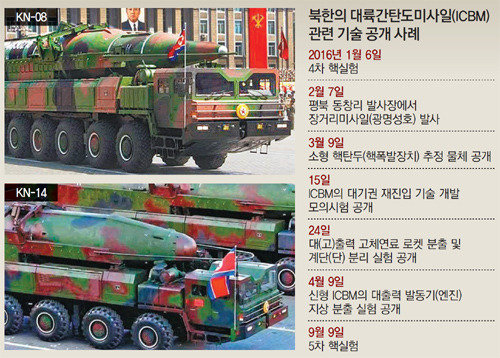Washington issues stern warnings against Pyongyang’s threats
Washington issues stern warnings against Pyongyang’s threats
Posted January. 10, 2017 07:05,
Updated January. 10, 2017 07:16

However, the South Korean military judges that the North’s statement signals an unusual situation. This means that Pyongyang could stage surprise launch of an ICBM soon after the inauguration of the Trump administration on Jan. 20, or right before the South Korea-U.S. joint Key Resolve military drill in March. “We are closely tracking and monitoring the possibility that (North Korea) will launch a (mobile) ICBM such as KN-08 or its enhanced version KN-14,” Seoul’s Defense Ministry spokesman Moon Sang-gyun said in a regular briefing on Monday. “We judge that (North Korea) has secured technology to launch an ICBM such as KN-08 from a mobile launcher.”
In fact, North Korean leader Kim Jong Un has been strongly urging his government to speed up the development of ICBM-related technology since the launch of a long-range missile (Kwang Myong Song) in February last year. The North has increased the intensity of its provocations through disclosure in succession of an object that is believed to be a miniaturized nuclear warhead, and scenes of a test to develop technology needed for ICBM’s reentry into the atmosphere, blast-off of a rocket powered by solid fuel, and staged separations of a rocket. “We are keeping a close eye on the possibility that the North will launch a new ICBM, which is the culmination of achievements from its development efforts, in a surprise move,” a source in the South Korean military said.
As for the method of launch, Pyongyang will also likely use a tactic that would maximize the impact of its launch in a surprise move. If the North fires an ICBM from its Dongchang-ni launch station, the entire launch process including moving, assembly and fueling of the missile propellant, will inevitably be exposed to U.S. spy satellites. For this reason, experts say that the North will make the provocation of launching a mobile ICBM or launching the missile from an underground launch pad (silo) unexpectedly.
“North Korea will calculate that if it succeeds in surprise launch of an ICBM loaded with a nuclear warhead targeting the U.S. mainland, it will be able to hold negotiations over nuclear arms reduction with the Trump administration as a country that effectively possesses nuclear weapons,” said a source in the South Korean military.
Washington has issued renewed warnings against Pyongyang. On Pyongyang’s threat of an ICBM, U.S. Defense Secretary Ashton Carter said at an interview with NBC, "If it was threatening, that is if it were coming toward our territory or the territory of our friends and allies."
“The so-called invisible wounds of war — are something we do take seriously and we have to take seriously,” Carter said, adding that the U.S. is endeavoring to be a step ahead and is a step ahead (to counter the threat of North Korean missiles).”
“We've deployed missile defenses in South Korea, Japan, Guam and, of course, we have 28,500 troops there today,” Carter said. North Korea's slogan is, 'fight tonight.' We're ready to defend the Korean peninsula and defend our friends and interests there.”
ddr@donga.comysh1005@donga.com
Headline News
- Med professors announce intention to leave hospitals starting Thursday
- Bridge honoring Sgt. Moon Jae-sik unveiled in Pennsylvania
- Chief of Staff Chung tells presidential secretaries to stay away from politics
- US FTC bans noncompete agreements
- N. Korea launches cyberattacks on S. Korea's defense companies







